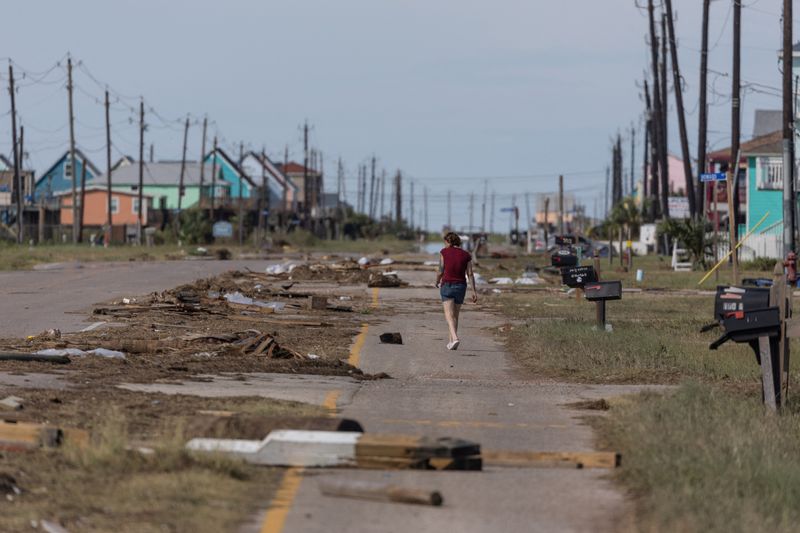By Brendan O’Brien and Ismail Shakil
(Reuters) -Millions of Americans in southeast Texas endured brutally hot conditions on Tuesday without the relief of air conditioning after deadly Tropical Storm Beryl knocked out power to a large portion of the region.
Scorching heat also baked much of the Western U.S. and Canada, raising the risk of wildfires.
About 2 million Texas homes and businesses were without electricity, according to Poweroutage.us, as temperatures were reaching above 100 degrees Fahrenheit (38 C) at midday on Tuesday, the National Weather Service said.
“Without power across much of Southeast Texas in the wake of Beryl, no air conditioning could make for dangerous conditions,” the service said.
Tropical Storm Beryl barreled into Texas on Monday, flooding highways, damaging homes and downing power lines in its path. Seven people were killed in the storm in Texas, including two people who were killed by fallen trees, the Houston Chronicle reported. Beryl killed 11 people in the Caribbean before reaching Texas.
Downgraded to a post-tropical cyclone on Tuesday, the storm weakened as it moved through the Midwest but still posed a risk for flash flooding and tornadoes through Wednesday, the National Weather Service said.
Houston resident Raymond Miller, 46, has been without power since 6 a.m. on Monday, leaving the food in his refrigerator inedible and his dog panting.
“I had trouble sleeping and the humidity makes it very hard to breathe in my apartment. Opening the windows last night didn’t do anything, it kind of made it worse,” said Miller, who works for a higher education institution.
Miller said he planned to sit with his dog in his air conditioned vehicle, which had only a quarter tank of gas left.
“There is no gas available. Everyone is out of gas,” he said.
In all, some 128 million people across the U.S. were under heat advisories on Tuesday. Most of the West – from Seattle down through California and into Arizona – was expected to see record high temperatures.
The national high of 129 F (54 C) was recorded near Tecopa, California, in the Mojave Desert, the weather service said.
Las Vegas reached 117 F (47 C), Phoenix hit 116 F (47 C) and Tucson 111 F (44 C).
The heat wave has also sent temperatures soaring across much of western Canada, increasing the risk of wildfires, said Armel Castellan, a meteorologist at Environment Canada.
The federal weather agency issued heat warnings on Tuesday for parts of the Pacific coast province of British Columbia, the main oil-producing province of Alberta, and Saskatchewan in the Canadian prairies.
As the heat wave moves east, temperatures will drop but the accompanying pressure instability could trigger dry lightning, raising the threat of wildfires, Castellan said.
“The secondary impacts – not just to humans but to the environment – namely, the wildfire concerns are accelerating,” Castellan said.

There were 59 forest fires burning in Alberta and 97 in British Columbia as of Tuesday.
The British Columbia village of Lytton, where 90% of structures burned down in a wildfire in 2021, was the hottest place in Canada at about 2 p.m. (2100 GMT) at 39 C (102 F).

